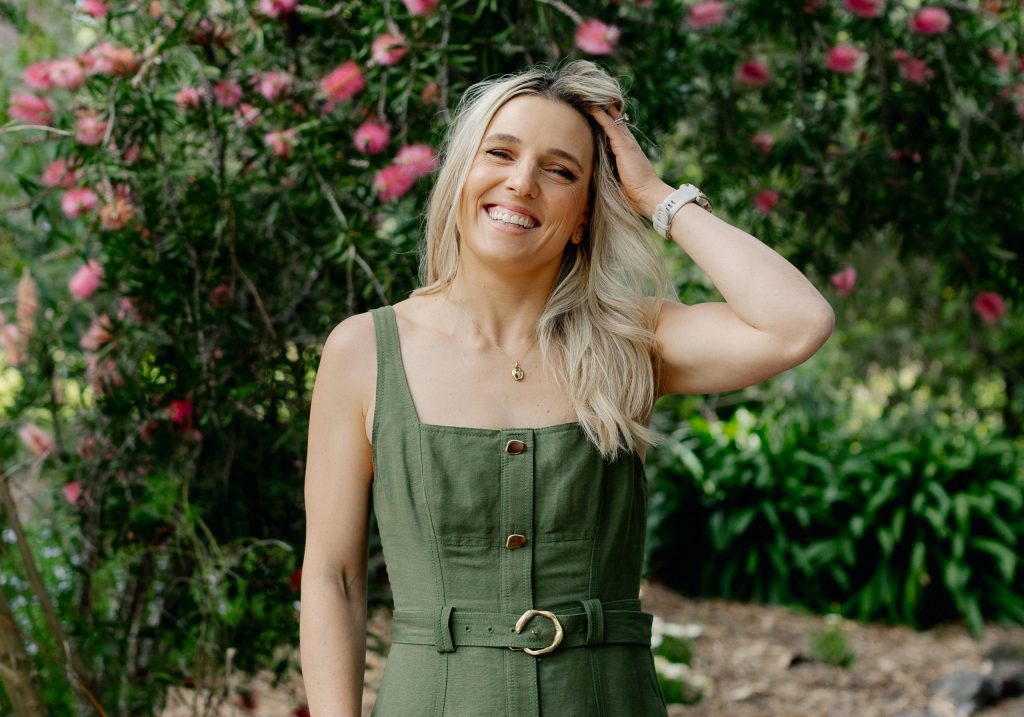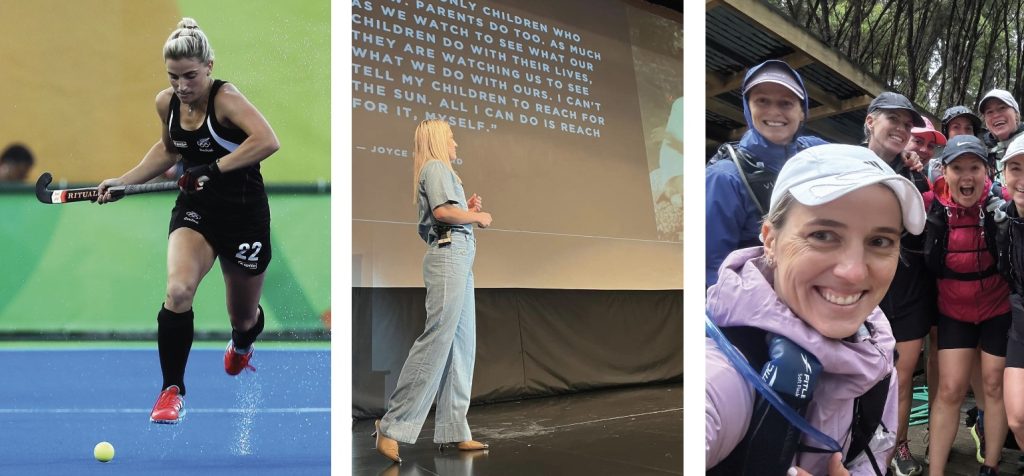It’s all About the Journey
As a school leaver, Gemma McCaw’s life took an atypical trajectory from that of your average Tauranga teen. While her mates were heading off to uni, Gemma was thrust into the world of international hockey. Words Pip Goldsbury.

Like many of New Zealand’s hockey greats, Gemma McCaw’s introduction to hockey began with an old stick cut down to fit a five-year-old tot. While her gear wasn’t flash, hockey came naturally to Gemma, and by the time the New Zealand hockey team achieved darling status at the 2000 Sydney Olympics, a seed was planted – maybe she could represent New Zealand too. However, Gemma’s pathway to the top was unconventional. A Tauranga age group player, Gemma balanced hockey with football, opting to play first XI football and second XI hockey at school. She’s grateful for the balance and thrived on football. ‘We had a really good school team,’ she enthuses. ‘We actually won a national tournament, which was fun!’
However, by the time Gemma turned 15, hockey was advancing, and she was selected for the Midlands team. Put into perspective, Gemma played senior representative hockey alongside and against the very best of New Zealand’s hockey players – and she was just a schoolgirl. Ironically, it was one of those Sydney Olympians, veteran Di Weavers, who took Gemma under her wing. Today, the tables have turned and it’s now Gemma encouraging Di to pair together for adventure racing.
Selection for the Black Sticks was a balancing act for Gemma, one of dedication and sacrifice. Alongside fellow Black Stick Charlotte Harrison, Gemma attended uni in Auckland, trained twice a day and lived in the halls of residence. Surrounded by students, Gemma and Charlotte’s lives looked very different to the others in the halls. Gemma laughs, ‘We were training for the Olympics, but oh my gosh, they were real students, partying and stuff! Obviously, we couldn’t do any of that.’
Living amongst revelling students might seem an odd choice for an international athlete, but it was a decision driven by finances. ‘We got paid $250 per week for Olympic simulation,’ says Gemma. ‘Accommodation cost $188, leaving us about $70 for food and gas. It was the cheapest way to do it and closest to the hockey turf.’
Gemma concedes that professionalism would’ve made it easier to represent her country, but today she’s grateful for the grind. Transferring to study extramurally, Gemma was a recipient of a Prime Minister’s Scholarship. ‘I think hockey forced us to work or study. You can’t just do hockey as a job. Instead, you develop a work ethic and I’m proud of the girls of our era.’ It was an ethic that she carried with her into full-time work. Up at 4.45 am, Gemma would train, work all day, and train again from 8–10 pm every night. Philosophical about amateur sport, Gemma says, ‘Rather than getting annoyed at our situation, we just got on with it. You played because you loved it and you played for the Silver Fern. It was all part of the journey.’
And what a journey! Three-time Olympian and Commonwealth Games silver and bronze medallist, Gemma has seen her fair share of drama. The highs have been euphoric, but they’re accompanied by heartbreak, including losses that saw the Black Sticks knocked from Olympic podium contention twice, relegated to fourth place instead. Gemma still beats herself up over a penalty shoot-out she missed. Drawn at the conclusion of the 2012 semi-final against the Netherlands, and with no score in the subsequent 15 minutes of extra time, the game went to a shoot-out. Gemma wasn’t the only Kiwi blocked by the Dutch goalie, but she took it personally.

However, Gemma has learnt to put failure into perspective. ‘I look at my life now, and realise you learn more from your failures and your losses than you do from your wins. We fought so hard, and it would’ve been nice to be rewarded. But sport doesn’t believe in fairy tales.’
Instead, Gemma’s fairy tale is her family, everyone from her supportive mum Michelle, to rockstar husband Richie, their three darling daughters – Charlotte, Grace and Ella, and beloved late grandmother Yvonne. Staggeringly brave, Gemma had one final crack at international hockey following the birth of Charlotte. In pursuit of that elusive Olympic medal, the family rallied around Gemma, providing the support she needed to chase her dreams. Still breastfeeding, it was a difficult time, both physically and emotionally. But then Covid happened and a fortuitous phone call to a friend put everything into perspective for Gemma. ‘Gem’, he said, ‘if you’re not enough without the medal, you won’t be enough with it.’ It was a profound moment for Gemma, realising the journey had been just as important. Retiring from international hockey, Gemma was comfortable, not just knowing she was ‘enough’ but also safe in the knowledge she was role-modelling real success to her children. ‘What do we want to teach our kids? We can’t just teach them when something goes well, they’re great. What happens if they lose, or they don’t win?’
Today, Gemma draws on her experiences as an international athlete, and, although busy with family, she has completed a Postgraduate Diploma in Positive Psychology and Wellness. Focused on the importance of women’s wellness, Gemma promotes the pillars of eat, sleep, move, think, feel and connect.
Having ‘fallen into public speaking’, Gemma sees too many women looking after others, but ‘leaving themselves behind’. As a mum, Gemma is acutely aware of maternal mental health and she’s passionate about lending a voice to a cause she feels strongly about. ‘We focus on the baby,’ she explains, ‘but who holds the mother? If we can support our mothers better in New Zealand, I feel we’ll have better outcomes for the children. All children deserve to be loved and cared [for], but it’s hard if you don’t have support.’
Behind the grit that propelled her to represent her country is a heart brimming with positivity and compassion.
Likening the pillars of health to the protective factors in a storm, Gemma asks, ‘What do I need to go out in a storm? I need a jacket and shoes and a coat.’ With the basics in place, so much more is achievable.
With her passion for sport, it makes sense that Gemma has combined her love for exercise with empowering women. Teaming up with Jess Baker, sports physiotherapist and performance coach, the pair are the driving forces behind Ladies Who Venture. It’s a simple concept but it’s compelling. Providing training programmes, support, community and connection, they guide groups of women to complete an outdoor adventure, including a recent 42 km run of the Abel Tasman Track. It’s not always formal. You’re just as likely to see Gemma in the hills around Canterbury, running and biking with friends or husband in tow, and enjoying a little time for herself, living the life she advocates.
Most recently, Gemma has thrown her support behind the Graci Foundation, the gynaecological cancer research trust, after attending an event where she was inspired by the story of a survivor. As Gemma points out, ‘There’s a lot of people who don’t survive, especially the gynaecological cancers that are hard to detect. But research means hope for women.’ Eager to increase awareness, Gemma admits it’s ‘not easy to talk about changes and things in the pelvic region’. However, Gemma challenges women to be positive and proactive about their gynaecological health. ‘Juggling multiple roles and demands … we really need to start talking.’ Typically, Gemma’s approach is an active one, participating as a special guest in a fundraising sunrise walk to Christchurch’s Godley Heads, a spectacular coastal track high on the Port Hills.
Gemma’s a livewire. There’s no denying she’s driven and purposeful. But behind the grit that propelled this woman to represent her country for more than a decade, is a heart brimming with positivity and compassion: a mum, a wife, a daughter and a friend, someone willing to share her journey to make ours better.

